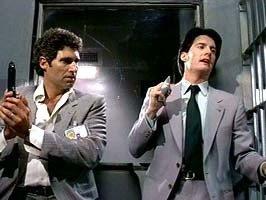
The Changeling - genuinely disturbing, this dread-heavy, slow-burning horror film has George C Scott's grieving father renting an old mansion, only to discover that there's something pretty scary already there. Builds the kind of spine-twisting unease that modern horror films don't even bother aiming for. Mind you, flying limbs are that much less difficult to get onscreen than genuine terror.

The Baby - a grown man dressed in a nappy is coveted by a social worker. And then you find out why. Utterly bizarre, but so twisted and peculiar that you have to watch, open-mouthed more often than not, as this freaky 'love story' reaches its ODD finale. Some call it touching. THAT is also ODD.

The Hidden - The criminally under-used Michael Nouri and the ever-ace Kyle Maclachlan do erstwhile battle with an alien that likes to 'hide-out' inside various unsuspecting hosts, not unlike Carpenter's 'Thing'. Said rogue being also has a penchant for fast cars, loud music and blowing shit up. Even more fun than that sounds.

Fright Night - Teenage horror-fan catches on that his neighbour is, in fact, a vampire responsible for offing several local girls. With the help of old telly horror-hack Roddy McDowall, he attempts to kill said vampire, a wonderfully seedy, debonair Chris Sarandon. Surprisingly decent effects for 1985, and mixes comedy and horror as well as Sam Raimi: high praise!

Miracle Mile - Anthony Edwards discovers by a chance phone call (don't you hate it...etc...) the rather unfortunate news that the world will end in 70 minutes, by nuclear assault. What would YOU do? Not what he does in this film, but it's still ace.

Polyester - spectacularly OTT (but still on the money) middle-finger to suburban America, Waters breaks yet more ground (clearly not content with merely having Divine chew on fresh dog shit) with this screeching, gaudy satire by including a 'scratch 'n' sniff' element (a bit weird when you're watching it on Beeb 2 sans 'odor card') to proceedings. You don't need the card - it's still completely mad and wonderful without it.

Deep Cover - Laurence Fishburne and Jeff Goldblum have rarely been better than in this cop drama, in which Fishburne infiltrates Goldblum's drug cartel only for the lines between by-the-book good guy and drug-dealing wrong 'un become perilously blurred. Great script by Michael Tolkin.

Killer Klowns From Outer Space - Aliens masquerading as clowns go on a murderous rampage in a small town, with only a small band of local teenagers (driving an ice cream van, obviously) to stop them...that simple, but creepy and hilarious in equal measure.

They Live! - The legendary John Carpenter's least appreciated great film, They Live! has wrestler 'Rowdy' Roddy Piper finding sunglasses that expose seemingly normal folk as aliens running a campaign of sloganeering subjugation that will stupefy the population and make them 'Submit To Authority', 'Watch Television', 'Consume' et al. Like a funhouse Orwell, and containing the longest punch-up in cinema.

Zazie Dans Le Metro - Whimsical tale of a young girl who evades the custody of her uncle to go on a freewheeling jaunt around Paris, which has never seemed more absurdly magical than here. Inventively funny, deliriously edited and terribly French, the whole thing is a bizarrre but entertaining escapade.









